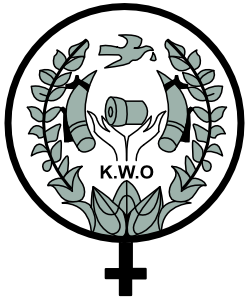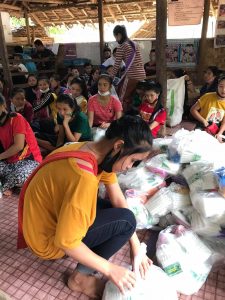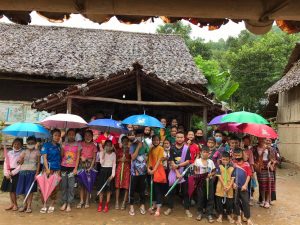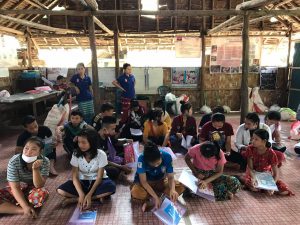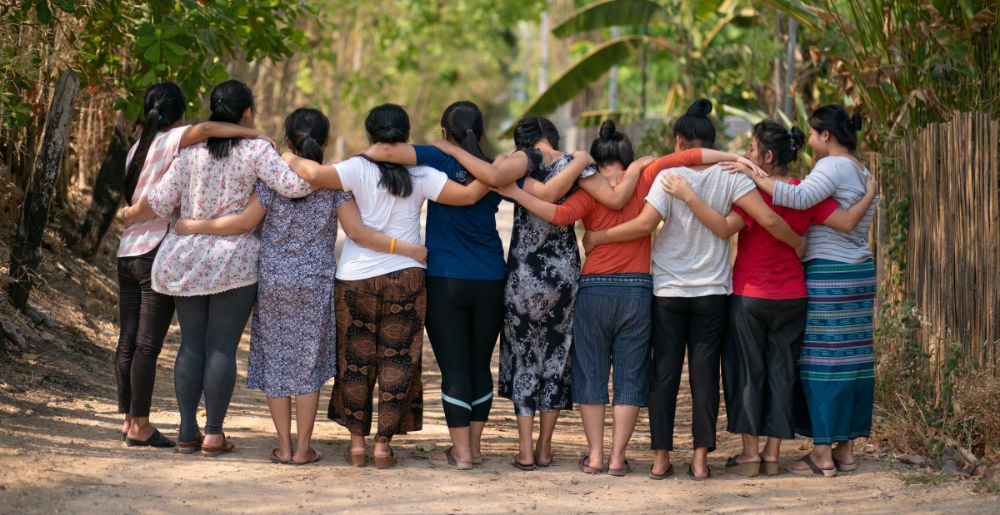All children have a basic Right to Education. Because of the many years of persecution and armed conflict with the Burma Army, there are not enough schools in the villages and towns of Burma. Many Karen village children do have access to a Primary School, but there is a lack of Secondary Schools. To continue their education children and youth often are forced to leave their homes and stay with distant family members or live in Student dormitories, which are close to one of the few High Schools. As part of KWO’s Child Protection program, we look for opportunities to support children, especially girls.
1. Project Goal
To support students, especially girls, with safe residential care in order to continue their education.
2. Location
We implement this project in 2 Districts in Karen State (Mu Traw and Pa’An District) and in one refugee camp (Mae Ra Ma Luang).
3. Overview
KWO implements this project through a partnership with “Enfants Du Mekong (EDM)” who provide funds and some technical support through their sponsorship program in France. Some children live with relatives in homes, and some live in Student Dormitories. The funds from EDM are pooled by KWO and shared to cover the needs of all the children, who then all receive equivalent support. The children and youth included in this project have been identified by KWO Social Welfare program as being at risk in conflict-affected communities, and from families in difficulty. The more vulnerable families in the community are those with large numbers of children, or with single parents, or extremely poor, and these conditions limit the parents’ ability to keep children in school.
Through this project KWO is able to provide support to keep girls, and boys, in school. We cover most of the costs of schooling each child every year. Costs of being educated include food, clothes, hygiene items, and in some cases, school fees. We support 71 girl students in Karen State living in 3 Girls Student Dormitories, and some in family homes. And we also support 35 students (male and female) in Mae Ra Ma Luang refugee camp who live in family homes or in student dormitories.
KWO has developed a set of policies and guidelines which all project staff, Dormitory caretakers, and KWO leaders and staff must follow and which ensure safe living conditions for children and youth separated from their families. Our main guidelines are presented in the KWO’s Minimum Standards for Student Dormitories titled “Not Less Than This”.
KWO worked with community leaders and established “Dormitory Committees” in each Dormitory site. The 5 members of each Committee oversee the dormitory, co-ordinate with the Caretaker, and ensure community involvement. They provide advice and support for the practical needs like buildings etc and for the emotional support of the children.
4. Beneficiaries and Participants
In the 2023-24 academic year:
- 106 children and youth were able to continue their schooling through support from this project.
- 71 girl students in Karen State.
- 35 students in one refugee camp (23 female, and 12 male)
5. Main Activities
The main activities we conduct are:
- Daily care and supervision for children and youth separated from their families.
- Provide daily nutritious food for those living in the 3 Girls Dormitories.
- Provide monthly ration of candles for night time study for all students.
- Provide monthly hygiene packs for all students including soap, toothpaste, laundry powder, and sanitary pads for the girls.
- Provide an annual kit of essential items for each student (1 x pair of shoes, 1x umbrella).
- Kitchen vegetable garden training for Girls Dormitory residents, in collaboration with KESAN.
- Training for Dormitory Caretakers, and students in Child Protection, and “KWO Dormitory Standards of Care.
- Maintain Dormitory buildings and compound in safe and comfortable condition.
- Pay school fees for some students.
- Monitoring of all students by KWO local leaders to ensure child protection standards.
6. Who does the work?
There is one Project Co-ordinator based in KWO central office in town who manages the whole project. There are 5 field staff which includes two field co-ordinators (one in Karen State and one in Mae Ra Ma Luang refugee camp) plus three Dormitory Caretakers (one for each of the 3 girls dormitories).
7. The Impact
The basic rights of children are more widely respected. The danger for these children of being forced to drop out of school was prevented. Children and youth at risk, were able to continue their schooling in safe and supportive conditions.
